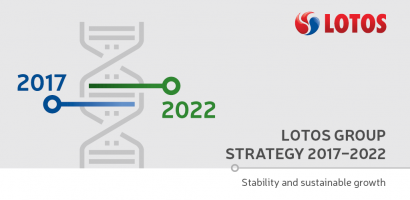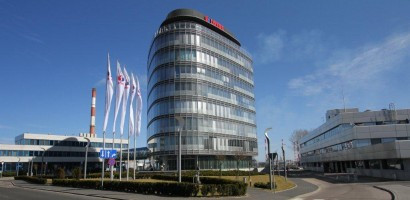
Today the Supervisory Board of Grupa LOTOS S.A. approved the directions of the '2013-15 Effective and Rising programme, which will facilitate implementation of the Company's strategy and deliver steady value growth for shareholders.
Today the Supervisory Board of Grupa LOTOS S.A. approved the directions of the '2013-15 Effective and Rising programme, which will facilitate implementation of the Company's strategy and deliver steady value growth for shareholders.
The primary objectives of the '2013-15 Effective and Rising programme are improvement of the Company's financial indicators, and achievement of continued growth through restructuring efforts and investments in the core business.
“While everyone else is struggling to stay afloat, we know how to win the future," explained Paweł Olechnowicz, Group CEO. “The '2013-15 Effective and Rising' programme is our insurance policy for the security and stability of the Group in turbulent market conditions. On one hand, we designed the programme to support the continued effective implementation of our strategic objectives and to widen our market lead, and on the other hand, to attain various other goals, such as the further efficient growth of our subsidiaries, unlocking of their investment potential, and facilitating access to various funding sources.”
The '2013-15 Effective and Rising' programme was developed by the Grupa LOTOS Management Board and has received full approval from the Group's employees and trade unions.
Today, LOTOS is a strong, stable organisation. It is the second largest company in Poland in terms of revenue, and the eighth largest in Central and Eastern Europe. Our visibility in the rankings is a result of making the right decisions and taking the right steps on a proactive basis. This includes the effective implementation of the 10+ Programme, the Package of Anti-Crisis Measures, and our Optimal Expansion Programme.
Key investments
LOTOS is consistently pursuing its investment and development programme throughout 2013. Work is underway to launch commercial production from the B8 field in the Baltic Sea, which will be brought on stream in 2015. Its production potential stands at 3.5 million tonnes of crude oil, and its average annual output is estimated at 250,000 tonnes.
LOTOS Petrobaltic continues production from the B3 field. After the PG-1 LOTOS unmanned platform is repaired, production from the field is expected to have increased by 15,000 tonnes per annum by 2026. Overall, LOTOS plans to produce approximately 100,000 tonnes of crude oil from the B3 field.
Baltic Gas, an SPV established in April 2013, is working on the development of the B4 and B6 gas fields, both of which have a production potential of 4 billion cubic metres of natural gas. Under the preparatory work schedule, acquisition of seismics and selection of a preliminary field development concept are scheduled for 2013.
As part of the agreement signed with PGNiG on exploration for and production of conventional and unconventional oil and gas, as well as on commercial cooperation, we have conducted joint operations in three licence areas in Pomerania and Warmia (Kamień Pomorski, Górowo Iławeckie and Bartoszyce).
In the refining segment, we are working on a petrochemical project with Grupa Azoty, which is key to LOTOS growth. Together, we are working on an initial feasibility study for two alternative projects: a pyrolysis (steam cracker) complex with polyolefin production, and an aromatics complex. If the results of the feasibility study are positive, design work on the selected options can begin. Grupa Azoty will be the main customer for the new units' products.
In order to fully leverage the benefits of the successful implementation of the 10+ Programme, LOTOS plans to build a delayed coker unit (DCU) at its Gdańsk refinery. This will directly enhance processing efficiency and help phase out production of unprofitable heavy fuel oil.
In its place, the annual output of motor fuels and coking coal will rise by as much as 900,000 tonnes and approximately 350,000 tonnes, respectively. The DCU unit will enter commercial operation in 2017. Estimates suggest that it will add an additional USD 2.2 per barrel to the Company's refining margin.
Furthermore, LOTOS intends to upgrade the refinery with a hydrogen recovery unit. The unit will enable the Company to significantly increase its hydrogen output (a key feedstock in production processes) and further widen its refining margin. Moreover, construction of an ATS unit will facilitate the transition from fuel gas to natural gas (for economic and environmental reasons), and production of ammonium thiosulphate for Grupa Azoty.
Furthermore, to fully optimise the assets of its Gdańsk refinery, LOTOS has implemented a plan to outsource the supply and collection of products and utilities (such as heat and electricity) which lie outside the Company's core business.
As regards retail, LOTOS envisages further rapid expansion of its service stations, especially in the budget segment. It is planned for the LOTOS Optima chain to include more than 260 stations by 2015. Another 18 LOTOS stations are to comprise the Motorway Service Area network. The rapid growth of its retail chain will help the Group achieve its strategic target of a 10% share in the retail fuel market.
In the area of logistics, LOTOS plans to construct a marine terminal on the Martwa Wisła, which will serve as its own wharf for handling components and products and diversifying its product dispatch and raw material import channels, as well as reducing costs.
Group restructuring so far
The process of developing two specialist business units – for logistics and infrastructure – based on the assets of four existing companies (Grupa LOTOS, LOTOS Czechowice, LOTOS Jasło, RC Ekoenergia) was begun two months ago. LOTOS Jasło has been renamed LOTOS Infrastruktura and is now responsible for professional infrastructure management at the Jasło and Czechowice plants. The logistics company, which is being built in Silesia, will conduct fuel storage and distribution activities. It will operate depots in Piotrków, Rypin, Poznań, Jasło, and Czechowice-Dziedzice.
On June 25th, Air BP (the aviation services division of BP) acquired a 50% interest in LOTOS Tank. Following the transaction, a new player emerged on the Polish aviation fuel market – LOTOS Air BP Polska. The joint-venture will operate at the Gdańsk, Warsaw, and Kraków airports. LOTOS Air BP Polska will leverage Air BP’s global customer relationships and technical experience, as well as LOTOS’ local expertise and supply capabilities.
Communications Office
Grupa LOTOS S.A.
ul. Elbląska 135,
80-718 Gdańsk,
tel. 58 308 87 31, 58 308 83 88, 58 308 83 55,
e-mail: media@grupalotos.pl
